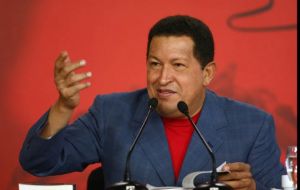MercoPress. South Atlantic News Agency
Venezuelan economy recovering but“15% devaluation” expected in 2011
 President Chavez: “there’s no crisis here”
President Chavez: “there’s no crisis here” Venezuela may formally devalue its currency “at least” 15% in early 2011, Barclays Capital said in a report sent via e-mail, changing its position after meetings with Finance Ministry and central bank officials in Caracas.
The government would then sell dollars at official rates of 3 and 5 Bolivar per dollar, instead of the current rates of 2.6 and 4.3 Bolivar that it established in January, Barclays analyst Alejandro Grisanti wrote.
The forecast follows this week’s announced that the Venezuelan economy contracted less than expected in the third quarter as a decline in oil exports was partially offset by increased public spending and a rise in manufacturing.
GDP shrank 0.4% in the third quarter from a year earlier, the central bank said in a statement. The contraction was lower than the 1 percent median estimate of seven economists surveyed by Bloomberg.
The IMF forecasts that Venezuela will be the only country in the region whose GDP shrinks in 2010. “Severe supply bottlenecks” and a “weak policy framework,” will cause the economy to contract 1.3%t in 2010, the IMF said. The economy contracted 3.1% in 2009.
President Hugo Chavez’s price and currency controls have limited industrial output in Venezuela, South America’s largest oil producer, and a nationalization surge has driven away investment even as the Venezuelan crude basket last week reached its highest price in over two years.
Chavez, who devalued the Bolivar currency on January 8, said Venezuela had “the luxury of shrinking 5%” and still being able to raise salaries and pay for public works. “This is the inverse of capitalism,” he said in August. “There’s no crisis here.”
The central bank also reported that Venezuela’s oil sector contracted 2.1%, the non-oil sector fell 0.2% in the quarter and private consumption fell 2.1%.
“The fall in levels of activity in this quarter can be attributed to less production of crude oil and refined products,” the central bank said in an emailed statement. “It should be mentioned that there was an increase in the production of naphtha and gasoline in order to satisfy a greater demand in the internal market.”
Imports fell 6.3% in the third quarter after Chavez dismantled a parallel bond market that Venezuelans turned to when they couldn’t obtain dollars through the government- controlled foreign exchange board, known as Cadivi.
A new, central bank-administered market, known as the Sitme, which trades at 5.3 Bolivar to the dollar, has traded $3.8 billion since opening on June 9.
Public spending increased by 3.2% in the period July to September as the government looked to shore up political support ahead of legislative elections on Sept. 26.
Manufacturing grew 0.1% following a contraction of 6.8% in the first half of 2010 after the government scraped power rationing in a bid to avoid a collapse of the national grid. The telecommunications sector grew 9.4%. The government posted a current account surplus of 2.57 billion USD in the quarter while the capital account had a 1.88 billion deficit.




Top Comments
Disclaimer & comment rulesCommenting for this story is now closed.
If you have a Facebook account, become a fan and comment on our Facebook Page!